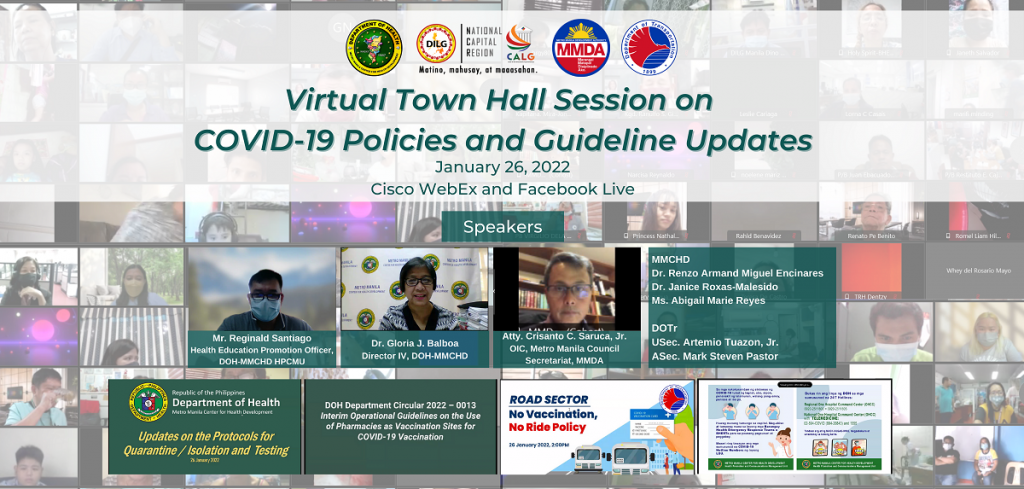
The Department of Health-Metro Manila Center for Health Development (DOH-MMCHD) hosted on January 26, 2022 a town hall meeting to update the LGU functionaries and the general public on the current policies and guidelines covering the governmentâs COVID-19 response in the National Capital Region (NCR). The town hall was conducted via Cisco WebEx and live-streamed on the DOH-MMCHD Facebook page.
The DILG-NCR invited Barangay Health Emergency Response Teams, Punong Barangays, health workers, and other DILG and LGU functionaries to participate in the virtual town hall. At least 1,000 participants were logged in on Cisco WebEx while more than 10,000 viewers tuned in through the Facebook Livestream.
Dr. Renzo Armand Miguel Encinares, Medical Officer III of the Regional Epidemiology and Surveillance Unit, started the meeting proper by providing updates on the new Quarantine and Isolation protocols in view of what is presently known about the severity and transmissibility of the emergent Omicron variant of COVID-19 and the current state of vaccination in NCR. The basic takeaway from Dr. Encinaresâs presentation is the reduction in the period of quarantine and isolation for vaccinated as well as unvaccinated individuals to as short as 5 days and 10 days, respectively.
Dr. Janice Roxas-Malesido, Head of Family Health Cluster for DOH-MMCHD expounded on the Interim Operational Guidelines on the use of pharmacies and medical clinics as vaccination sites for COVID-19. This development was prompted by the need to: improve vaccine coverage and accessibility, minimize vaccine wastage, and address the manpower shortage among healthcare personnel. The move is also expected to mitigate some of the pressure on LGUs at the forefront of the fight against the virus.
On the enforcement side, Atty. Crisanto C. Saruca, Jr. (OIC, Metro Manila Council Secretariat) introduced MMDA Resolution No. 22-01 which aims to restrict the mobility of the small minority in the NCR who still remain unvaccinated. The said resolution has the effect of limiting the mobility of the unvaccinated in public places unless absolutely required for medical reasons or to avail of basic necessities. Restrictions include exclusion from indoor and al fresco dining, malls, hotels, and other similar facilities as well as domestic travel. Unvaccinated individuals who travel to work may also be required to undergo RT-PCR testing every two weeks.
Insofar as access to public transport is concerned, Department of Transportation (DOTr) Undersecretary Artemio Tuazon, Jr. reiterated the present âNo Vaccination, No Rideâ policy currently enforced in the NCR, subject to some exceptions. Riders of public transportation are required to present their vaccination cards or proof of medical exemption from vaccinations before being allowed to avail of said services.
Relatedly, DOTr Assistant Secretary Mark Steven Pastor elaborated on the implementing guidelines covering the responsibilities of public transport operators in ensuring compliance with vaccination protocols not only by the riding public but also by their drivers, conductors, dispatchers, and other transport workers. In this regard, DOTr initiated a mobile vaccination drive to vaccinate 7,755 transport workers as of December 31, 2021 with an additional 828 vaccinated as of January 2022 todate.
MMCHD Information Officer Abigail Marie Reyes outlined the strategy for addressing vaccine hesitancy by using a multi-pronged approach involving active demand generation activities, countering or taking down vaccine misinformation, or outright fake news posted online. It also promotes the use of KIRA, a ChatBot to answer queries from the public, and encourage wider use of DOHâs Telemedicine facilities and COVID-19 hotlines before proceeding to the hospital in the event of exposure to COVID.#
IO III Maria Rosario L. Insigne
